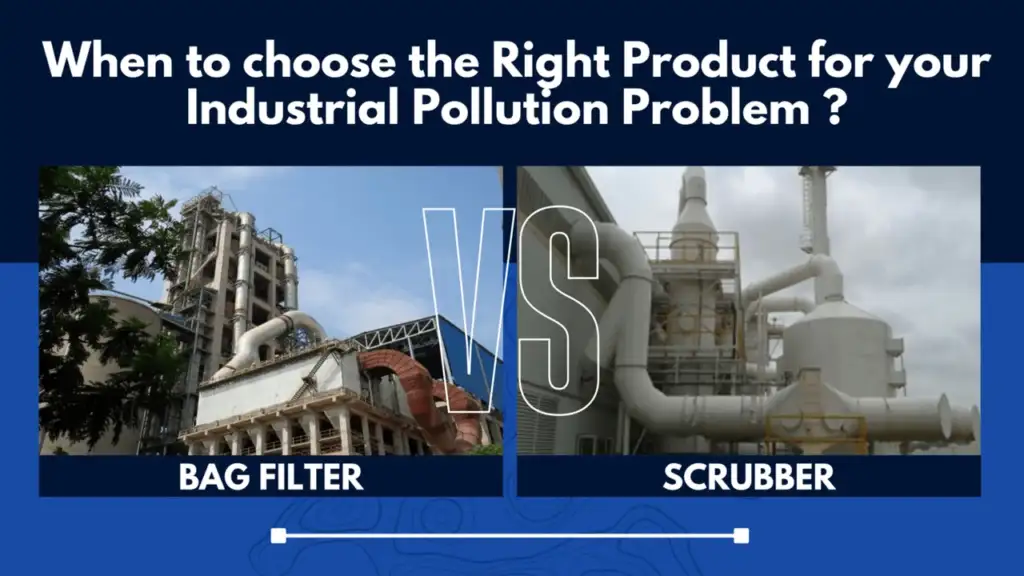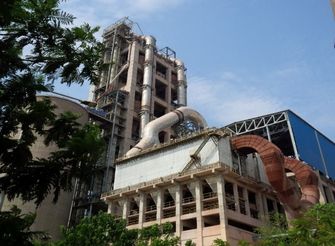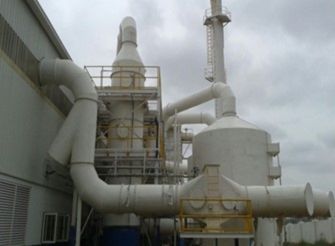Bag Filter Vs Scrubbers When to Choose the Right Product for Your Industrial Pollution Problem?

Bag Filters
The 21st century has witnessed tremendous levels of emissions. Increasing awareness of the harmful effects of air pollution has led to stricter norms by the Pollution Control Board to curb emissions. More and more industries must comply with these guidelines to limit air contamination.
When it comes to controlling industrial pollution, there has been a lot of discussion and confusion about the best option: a bag filter or a wet scrubber.
Does your business face the same dilemma? With years of expertise in Air Pollution Control, our team has identified the major factors to consider when choosing between a bag filter and a scrubber.
What is a Bag Filter?
A bag filter is a pollution control device that separates particulate matter from the air of a manufacturing or processing facility.

RIECO supplied process baghouse for 11,00,000 m3/hr gas flow.
Important parameters to consider while selecting/designing a bag filter:
- Volume flow rate (m3/hr)
- Dust load at bag filter inlet (g/m3)
- Required outlet emission (mg/Nm3)
- Particle size distribution (microns)
- Operating/surge temperature (°C)
- Nature of dust (acidic/hygroscopic/abrasive/explosive)
- Bulk density of dust (kg/m3)
What are Wet Scrubbers?

One of RIECO’s supplied scrubbers for handling corrosive gases.
In a wet scrubber, the dirty gas stream is brought into contact with a scrubbing liquid via a spraying mechanism. The scrubbing liquid reacts with or absorbs the pollutants to neutralize their harmful effects.
- Wet scrubbers can handle high temperatures and moisture.
- Flue gases are cooled in wet scrubbers, enabling smaller overall equipment size.
- They can remove both particles and gases.
- They can neutralize corrosive gases.
The following table states the relative advantages and disadvantages of wet scrubbers compared to other control devices:
| Advantages | Disadvantages |
|---|---|
| Small space requirements: Scrubbers reduce the temperature and volume of the unsaturated exhaust stream, thereby reducing vessel sizes compared to other control devices. |
Corrosion problems: Water along with dissolved pollutants can form acid solutions that are highly corrosive. Wet–dry interface areas can also result in corrosion. |
| No secondary dust sources: Particles once collected cannot escape from hoppers or during transportation. |
High power requirements: High operating costs since high collection efficiencies for particles are achieved only at high pressure drops. |
| Handles high-temperature, high-humidity gas streams: Condensation or temperature-limit problems do not occur as in the case of ESPs and baghouses. |
Water-disposal problems: To meet wastewater regulations, settling ponds or sludge clarifiers may be needed. |
| Minimal fire and explosion hazards: Many dry dusts are flammable. Using water eliminates the possibility of explosion. |
Difficult product recovery: Dewatering and drying of scrubber sludge make recovery of dust for reuse difficult and expensive. |
| Ability to collect both gases and particles. | Meteorological problems: Saturated exhaust gases produce steam plumes resulting in precipitation and fog, which may cause local meteorological issues. |
To conclude, here are guidelines to help you select the correct solution for your air pollution control problem:
| Parameter | Bag Filter | Scrubber |
|---|---|---|
| Dust characteristics | Dry and free-flowing | Hygroscopic and sticky |
| Particle size | Fine | Large |
| Temperature to be handled | < 250 °C | > 250 °C |
| Contaminants involved | Does not contain SO2, NH3, etc. | Contains SO2, NH3, etc. |
Did you know?
With 46+ years of experience, RIECO’s Clean Air Solutions have served pollution control requirements across 10+ industries, with 3000+ happy customers worldwide.
Connect with our experts at rvp@rieco.com, harshwardhan@rieco.com, and rahul.pandagale@rieco.com to learn more about our Clean Air Solutions. Visit www.rieco.com to explore our offerings.
Thank you for reading!




